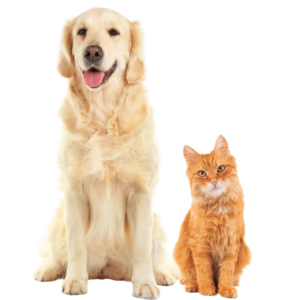One of the most common health problems in pets is being overweight or obese. While a few extra pounds might seem harmless, it can lead to a number of health problems for your pet. Their health is at risk if they weigh at least 10% more than their ideal weight, e.g., they should weigh 15 kg and instead weigh 16.5 kg.
How can I tell if my pet is overweight?
This is fairly easy to do at home. If you’re not sure, place your fingers on your pet’s chest and feel for their ribs. If you can feel their ribs without seeing them through the coat, it means your pet is at a healthy weight. On the other hand, if the ribs are hard to feel, your pet is probably overweight.
Another option is to weigh them. You can always drop by the clinic and ask our team members to weigh your pet. Feel free to ask them questions about your pet’s weight. They’ll be happy to help and give advice.
Why is being overweight dangerous for my pet?
Being overweight poses many risks for dogs and cats. Besides damaging their joints, being overweight puts them at risk for many diseases, such as diabetes and cardiorespiratory problems. Overweight pets have a shorter life expectancy, so we recommend that our patients follow a tailor-made plan to help their pet lose the excess weight.
How can I get my pet lose weight?
There’s no magic weight loss button for your pet. The best thing you can do is to change up their diet and get them following an exercise program.
For their diet, you should first check if you’re feeding them the right type and amount of food. You can also give your pet special food that promotes weight loss, while providing them with the nutrients they need for their metabolism.
Speak with your vet or a pet nutritionist to make sure you choose the right food for your pet.
As for physical activity, it will alternate between active play and exercise. For cats and very small dogs, simply getting them to move around the house a few times a day may be enough. For larger dogs, running, frequent walks or throwing a ball or frisbee in the park are all appropriate types of exercise. However, if your pet has joint or muscle problems, be sure to choose the right kind of exercise for them.
If you’d like more advice on helping your pet lose weight, please contact us. Our team will be happy to help you.




